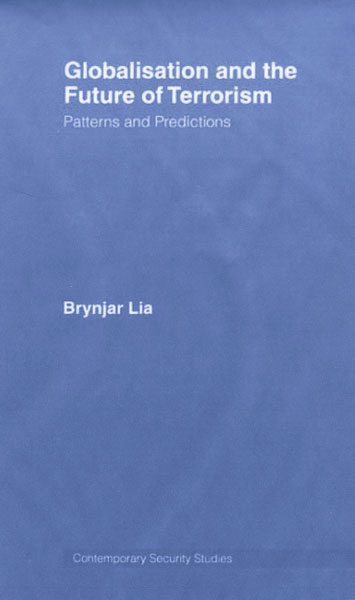Globalisation and the Future of Terrorism: Patterns and Predictions, by Brynjar Lia – A review by Ahmed H. al-Rahim.
 Since 11 September 2001 there has been a deluge of studies on terrorism, most of them focusing on al-Qaida and the Muslim world. One problem is that their authors tend to work outside the field of Near Eastern or Islamic studies, often with little knowledge of the languages, cultures and religion of those whose motives and actions they seek to explain or predict. But one recent book, Globalisation and the Future of Terrorism, by Brynjar Lia, a noted scholar of Islamist movements at the Norwegian Defence Research Establishment, is a welcome contribution to the growing literature.
Since 11 September 2001 there has been a deluge of studies on terrorism, most of them focusing on al-Qaida and the Muslim world. One problem is that their authors tend to work outside the field of Near Eastern or Islamic studies, often with little knowledge of the languages, cultures and religion of those whose motives and actions they seek to explain or predict. But one recent book, Globalisation and the Future of Terrorism, by Brynjar Lia, a noted scholar of Islamist movements at the Norwegian Defence Research Establishment, is a welcome contribution to the growing literature.
Lia begins by lamenting that terrorism researchers have largely neglected the issue of globalization, and have not utilized futuristic studies to analyze the phenomenon. He believes that globalization in its various manifestations – including armed national struggles (e.g. the Palestinian–Israeli conflict), the increasing interdependence of economies and international relations, technological innovations, ideological shifts (such as al-Qaida’s transnational Salafi-jihadism) and migration (mainly diaspora communities in the West) – may be major factors in the recent rise of terrorism. Lia presents a framework for analyzing how these complex structural and societal factors shape, and can possibly predict, future patterns of terrorism.
One dynamic that has contributed to the resurgence of terrorist groups, Lia believes, is the unipolar world in which the hegemonic power of the United States is being challenged by regional players, including newer nation states or growing economic powers such as China and India. Other challenges come from power vacuums in older, perhaps failing states such as Yemen, and the rise of al-Qaida in the Arabian peninsula. The fact that the US military involvement in Afghanistan and Iraq provides a focus for terrorist groups is reflected in narratives that, at least in the Muslim context, include such themes as ‘the defenders of the sanctity of the Islamic lands against the Crusader–Zionist entity’, ‘the liberation of Jerusalem’, and calls to jihad against enemies near and far.
In Lia’s view, the United States will continue as the dominant military power for the foreseeable future, and so too will terrorism increase, particularly the transnational kind. But the form of terrorism is likely to change or adapt in response to different manifestations of globalization, and to technological innovations – especially in communication, weapons and counter-terrorism technologies. The question of whether a multipolar world would lead to the end of terrorism in the near or long term remains unanswered.
Lia’s analysis focuses on the physical factors and structural economic imbalances brought about by globalization, which he sees as the ‘primary’ causes of terrorism (largely because they can be quantified). He therefore relegates ideological and religious drivers to second-order problems (‘… it is very hard to make reliable predictions about something as intangible and fluid as extremist ideologies’; p.159). This is unfortunate. For this reviewer, an assessment of the ideologies of Islamist terrorism (i.e. terrorism that seeks religious justifications for its actions) is fundamental to understanding the phenomenon of terrorism and support for it in the Muslim world. Violent extremist ideologies and the use of religion are essential to terrorist groups in recruiting new members, developing their narratives, and ultimately justifying their actions.
Lia does, however, point out an important but often under-appreciated trend in (Islamist) ideology, and that is the strengthening nexus between religious extremism and extreme nationalism, which appears to be one form of rejecting globalization. One case in point, not mentioned in the book, is al-Qaida’s not uncontroversial (in Salafi-jihadi terms) 2006 declaration of ‘the Islamic State of Iraq’ (emphasis added). Al-Qaida’s use of ‘Iraq’, the colonial (national) appellation, rather than the traditional ‘land of the two tributaries’ associated with early Islamic conquests, was an explicit appeal to nationalism as opposed to pan-Islamism.
With its survey of the complex literature on terrorism, which effectively separates the wheat from the chaff, Lia’s book will remain a tour de force of terrorism studies for some time to come.
Globalisation and the Future of Terrorism: Patterns and Predictions, by Brynjar Lia. Contemporary Security Studies Series, Routledge, 2006, 280 pp.
